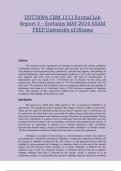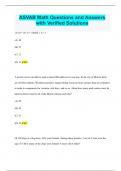University of South Africa
TLI4801 STUDY GUIDE 2022
INCLUDES THE OCTOBER NOVEMBER
GUIDELINES
, Law
Guide
South African Criminal Procedure Content Links
Criminal procedure in South Africa refers to the adjudication process of that country’s criminal law. It Criminal Procedure
forms part of procedural or adjectival law, and describes the means by which its substantive
History
counterpart, South African criminal law, is applied. It has its basis mainly in English law.
History
Sources
Stages
Getting An Accused To
When the British occupied the Cape permanently in 1806, they retained the Roman-Dutch legal
system. They concluded, however, that the criminal justice system was archaic, and so introduced one Court
based on their own in 1828. It has been developed over the years to suit local conditions. Bail
The South African system today is basically accusatorial: that is, the state accuses and the accused Bail Pending Appeal
defends. The accusation and its proof are state-driven, with a state-appointed prosecuting authority. Ascertainment Of
Sources
BACK TO TOP
Features
Charges
The sources of South African criminal procedure lie in the Constitution, the Criminal Procedure Act Amendment Of Charges
(CPA), other statute law (for example, the Magistrates’ Courts Act, the Supreme Court Act and the
,Drugs and Drug Traf cking Act) and the common law. Criminal procedure overlaps with other
Plea Of Guilty
branches of the law, like the law of evidence and the substantive law.
Stages
Plea Of Not Guilty
After Plea
Contested Trial
Criminal procedure can be divided into three stages or phrases, namely pre-trial, trial and post-trial.
These divisions are not absolutely watertight. Sentence
Methods Of Getting An Accused To Court
Criminal Appeals
Review Proceedings
The CPA lists four methods of securing the attendance of an accused person in court. These bear an Prosecution Of Crime
important relationship to the constitutional rights of freedom and security of the person, of freedom of Search & Seizure
movement and residence, of access to the courts and of “arrested, detained and accused persons.” The
Legal Representation
methods are as follows:
Disclosure By Prosecution
arrest;
Indictments In High Court
summons (for lower courts only);
written notice in terms of section 56 of the CPA (for magistrates’ courts only); and Duplication Of Convictions
indictment (for the High Court only). Particulars To Charge
The basic principle of South African criminal procedure is that of access to courts, in accordance with
Autrefois Convict & Acquit
BACK TO TOP
section 34 of the Constitution. There is no general provision for trial in absentia.
Plea & Sentence
Arrest
Inquests
The manner in which arrests are to be carried out is dealt with in section 39(1) of the Act, which
provides that arrests may be effected with or without warrant and which envisages three scenarios:
, provides that arrests may be effected with or without warrant, and which envisages three scenarios:
Asset Forfeiture
that the arrestee will submit to custody;
Child Justice Act
that he must have his body touched by the arrestor; or
that, if need be, his body must be forcibly con ned.
He is then to be informed of the cause of the arrest or, in case of an arrest with a warrant, to be given
on demand a copy of the warrant. The effect of the arrest is that the arrestee is in lawful custody.
It is very important that the arrest be effected lawfully. If the arrest is not lawful, resistance or escape
by the arrestee will not be unlawful, and the arrestor will have committed an assault. Furthermore,
subsequent detention would also be unlawful, with the possibility of civil damages. The ensuing trial,
however, would not automatically be invalid.
Male inhabitants of South Africa, between the ages of sixteen and sixty, are obliged to assist with the
arrest if called upon to do so by a police of cial. Failure to comply with such a request without lawful
cause attracts criminal liability.
Anyone who may lawfully arrest a person and who knows or reasonably suspects that person to be
on certain premises may, after audibly demanding access, giving reasons, if necessary break open and
enter to search and arrest the suspect.
BACK TO TOP
Warrant
Without warrant
Peace of cers—that is to say, police of cials and other empowered of cials—may arrest without a
warrant in the circumstances set out in section 40. The most important of these circumstances are






